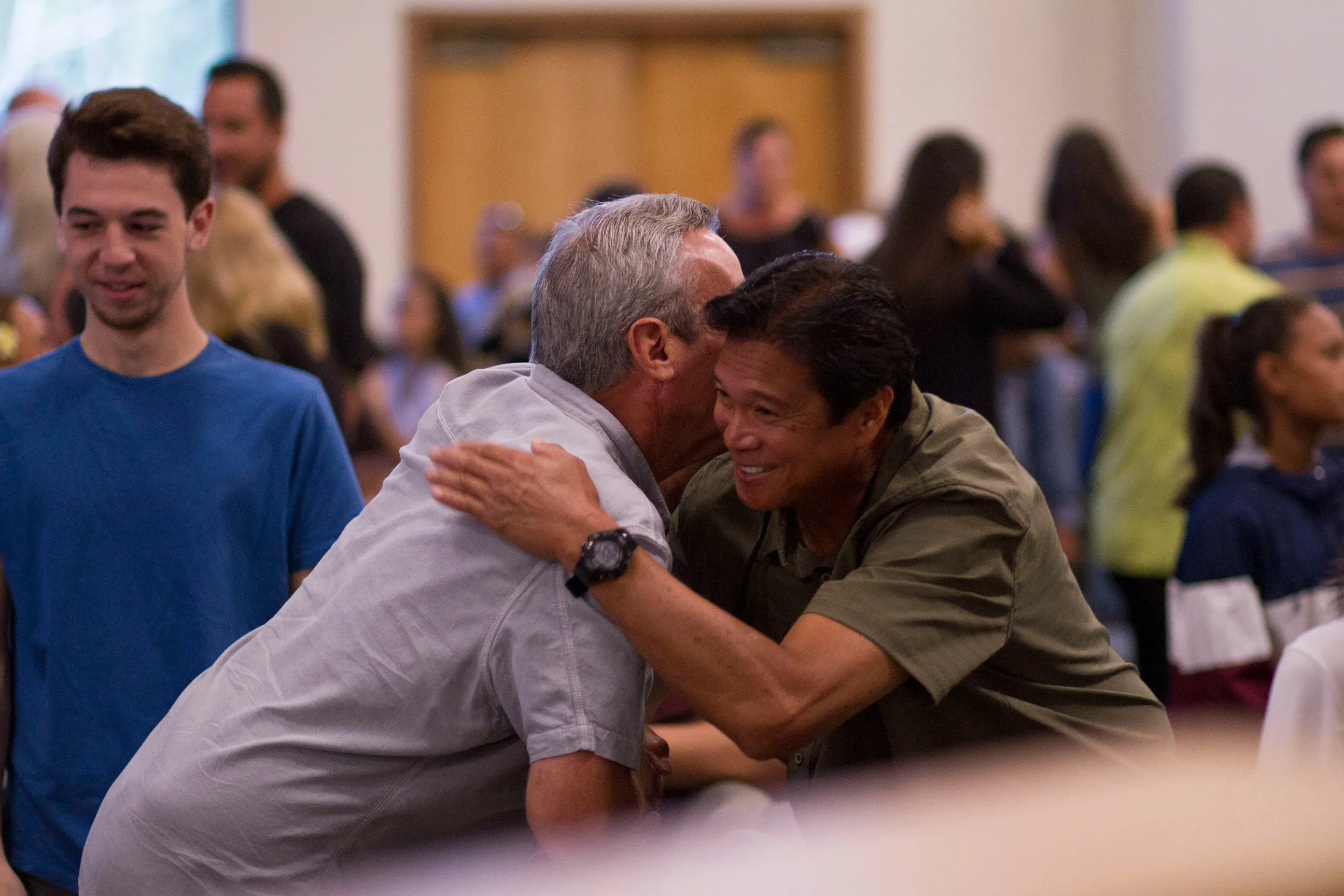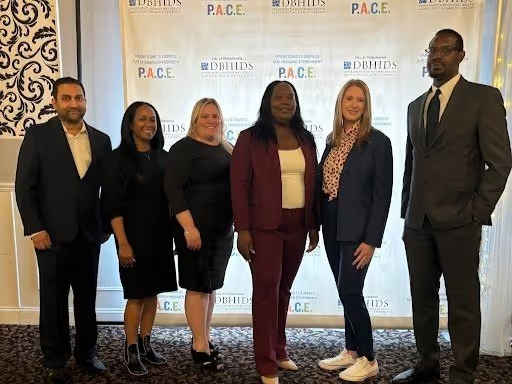May 27, 2024
Bridging the Salud Mental Gap
A new cohort of Spanish-speaking peer mental health specialists is ready to provide real-time support for the Philadelphia population who most needs it

Background
In 2022, Paola Franchini and her children had barely made it out of their home when it exploded from a chimney fire. Franchini, who moved to the U.S. from Chile in 2001, had spent most of her adult life helping members of the Hispanic and Latino community adopt healthier habits as a lifestyle coach and through her business, Vida Sana, Vida Feliz. After being left with burns on her face and body, as well as emotional and mental scars, Franchini suddenly realized she would now have to learn to cope with her own trauma and health.
Franchini believes that being connected with someone who had overcome trauma from her Latinx community would have made a big impact in her recovery.
“It’s amazing to have someone who supports you and visits you and empathizes with what happened or is happening to you,” she says. “Having someone by your side who experienced trauma can give you so much hope. I would’ve felt really good.”
Certified Peer Specialist Training
Today, Franchini is one of 13 recent graduates of a Certified-Peer-Specialists (CPS) class facilitated by the non-profit mental health advocacy organization Mental Health Partnerships (MHP). Like many CPS classes in the past, this one is diverse — some members are older; some came from Puerto Rico; others came from Colombia; some lived with substance abuse; others spent years with depression. However, these graduates have two things in common: 1. They are in or have been through behavioral health recovery. 2. They all speak Spanish.
The growing mental health crisis among Latino and Hispanic Americans
In Philadelphia, as in most of the nation, mental stress among adults is worsening. What is less often publicized: Mental stress is worsening most among Hispanic and Latino individuals.
Nearly 30 percent of Philadelphia’s Hispanic residents report experiencing five or more days a month of mental stress, according to The City of Philadelphia’s 2021 Health of the City report, compared to 21.2 percent of White and 20.1 percent of African American respondents. In addition, Hispanic males have the second-highest percentage of reports of death by suicide, behind White males. (The report does not separate Hispanics and Latinos.)
Despite these rates, Hispanics and Latinos are the second least likely group to receive mental health treatment nationwide. According to The National Alliance of Mental Illness, only 36.1 percent of Hispanics and Latinos received treatment, compared with over half of their White counterparts. In Philadelphia, the issue is compounded by the fact that Hispanic communities have the highest percentages of uninsured children and adults.
“There’s a centrality to the human experience where we gravitate to those that best understand us, to those that share identities with us.” — Dr. Racquel Assaye
Peer-to-peer support
MHP set out on a mission to increase access to mental health services 70 years ago. Starting out, the independent non-profit organization played a key role in shutting down abusive and misguided state mental hospitals that often confined people with mental health challenges against their will. “Our primary charge was to get rid of the stigma and to get rid of mandatory confinement,” says MHP’s Acting President and Chief Executive Officer Racquel Assaye. Back then, people who were diagnosed with schizophrenia were treated the same way as somebody with, say, dyslexia. Today, MHP specializes in treating vulnerable populations, including older adults, people with addiction, and members of the LGBTQ+ community.
Today, MHP has five brick-and-mortar locations in Philadelphia, five more in the suburbs, and two in Delaware that provide a wide range of services for people and family members of people experiencing homelessness, substance abuse and other mental health conditions. Their model is, in large part, predicated on peer-to-peer counseling and guidance from CPS’s.
MHP offers free Certified Peer Specialist training for people who are over age 18, have passed background checks, and have experienced a behavioral health disorder or are currently in recovery. Training lasts 75 hours, typically two weeks, and, if successful, results in a CPS certificate from the Pennsylvania Certification Board.
In 2017, MHP established a new way to connect people in need of behavioral health support with CPSes: an English language Peer Support Chatline, open Monday through Friday from 9am to 7pm. Last year, MHP trained 406 CPSes to work the chatline — all in English. The success of this program emphasized the lack of services available to Spanish speakers. “There’s a centrality to the human experience where we gravitate to those that best understand us, to those that share identities with us,” says Assaye.
A new class of Certified Peer Specialists
But training Hispanic and Latino peers to become CPSes isn’t just about linguistics. “We tend to feel more inclined to share our struggles if we know that there will be empathy,” says Assaye. “And more than that, there’ll be understanding.” Assaye points out that immigrants comprise 33 percent of the Hispanic and Latino community. According to the American Psychological Association, many Latino immigrants experience stressors related to migration, such as language barriers, family reunification and discrimination. “They are already experiencing a mental health issue, but they’re experiencing it in the context of both racism as well as immigration status acculturation,” Assaye says. “It will be best if we’re using the same peer model where somebody needs to understand your situation, and better be able to speak to you with understanding and empathy.” While many CPS graduates work operating MHP’s chatline, staying with the organization is not a requirement. Once they receive their certification, CPSes can work anywhere in Pennsylvania. For MHP, investing in training Spanish-speakers was an important step towards providing PA’s Hispanic communities support from someone who understands them.
Community in diversity
Franchini and her classmates’ graduation took place at Community Behavioral Health’s Center City suite at 8th and Market streets. The ceremony featured speeches from Assaye, DBHIDS Commissioner Jill Bowen — and each of the 13 graduates. Some shared their motivations to complete the training despite enduring emotional challenges, and others shared the life experiences that led them to want to help others who struggle alone. Onlookers cried tears of joy and pride as they witnessed their loved ones taking a step towards self-improvement.
“Listening to their stories was extremely inspirational for me,” she says. “Seeing that people made it to the CPS program despite what they’ve been through showed me that wanting is power. We want to show other Latinos that if we did it, they can do it too. As a Latina immigrant in this country, I feel proud to be part of this project and we’re ready to go out to offer hope to the Latino community, which really needs it.”
The MHP 9am-7pm Chat Line can be accessed through their website. They can be reached through their site or via phone number at (800) 688-4226.
If you are having thoughts of suicide, call or text 988.
Related Reading from Our Advocacy Corner
Stay informed and inspired by exploring more stories from our Advocacy Corner. From uplifting community visits to powerful policy insights and personal recovery journeys, these articles spotlight the people and progress shaping mental health advocacy today.
Transforming Lives, Strengthening Communities
From peer-led recovery programs to statewide advocacy and education, our work touches thousands of lives every year. These numbers reflect our deep commitment to accessible, compassionate, and person-centered mental health support across Philadelphia and Southeastern Pennsylvania.


8,480
individuals and families served
34
active programs across the region
1,106
Peer Specialists trained each year
5,801
people supported through direct services
3000+
individuals reached monthly through homeless outreach
1,573
engaged in community advocacy
Real Stories of Hope and Recovery
We’re here to champion every journey to wellness, offering unwavering support and transformational advocacy. Together, we foster resilience and recovery—so everyone can thrive and live their fullest life in the community, free from barriers to mental health care.
"I'm so grateful for the community that's here and the people that I get to work with in a way that they inspire me every day."
"Every experience I've had with MHP thus far has been great, from the training to being able to get support, a community, sponsorships to go places I never thought I'd go."
"MHP has given me so much, I want to give back."
"Give you your own purpose, you know, just like doing something more. Just a good feeling for me. Now I can be productive."
"MHP has a long history of being a really trusted and reliable resource for peer specialists.
So these experiences already live within your walls."
"The incredible empowerment and the impact that peers have in the field of mental health."
"There's something really, really powerful that happens when you're connecting with someone who's sitting across from you and says, you know, I see you and I hear you. Because I've been there."
"...and just that little click. Wow, it's so powerful just to have somebody who understands exactly how you feel, because we can sympathize all day, but to have somebody else in the room with me, to say, I've done it too, I've experienced that too, allows for a bond that goes beyond words."
"That opened me up to talk to other people so I could coach them and have them get the aha moment again. I did it and I'm glad that I got into new ways of thinking."
"I'm able to be helpful just to know that, like, all that hard work I put through actually paid off."
"And I hope that everybody would get the opportunity to connect with that organization"
"At Mental Health Partnerships. Together..."
"Together..."
"Together..."
"Together...we build hope."
"Together...we build hope."
"We build hope."
"We build hope."
"Together...we build hope."
"Together...we build hope."
"Together...we build hope."
"Period!"
Guiding Principles for Empowerment and Growth
At the heart of our mission lies a steadfast commitment to core values that shape every aspect of our work. These values—rooted in hope, empowerment, and respect—guide us in fostering environments where individuals can thrive, exercise self-determination, and pursue lifelong learning. By embracing a holistic, non-judgmental, and culturally aware approach, we empower individuals to achieve their full potential and contribute to their communities.

Together, We Build Hope
At Mental Health Partnerships, we are dedicated to fostering hope and resilience. Our mission is to create a supportive environment where individuals can regain control of their mental health and live fulfilling lives. We offer personalized care that aligns with your unique needs and helps you connect with a community that cares.




Real Stories of Hope & Gratitude
Hear directly from individuals whose lives have been touched by our programs and services. Whether it’s case management, family support, or peer-led guidance, these stories showcase the power of compassionate care and unwavering belief in every person’s potential for recovery and growth.

Let’s Take the Next Step Together
At MHP, we understand that the journey to mental wellness can feel overwhelming. With peer-led support, proven resources, and a warm, caring community, we’re here to guide you through every step—so you never have to walk this path alone.



































